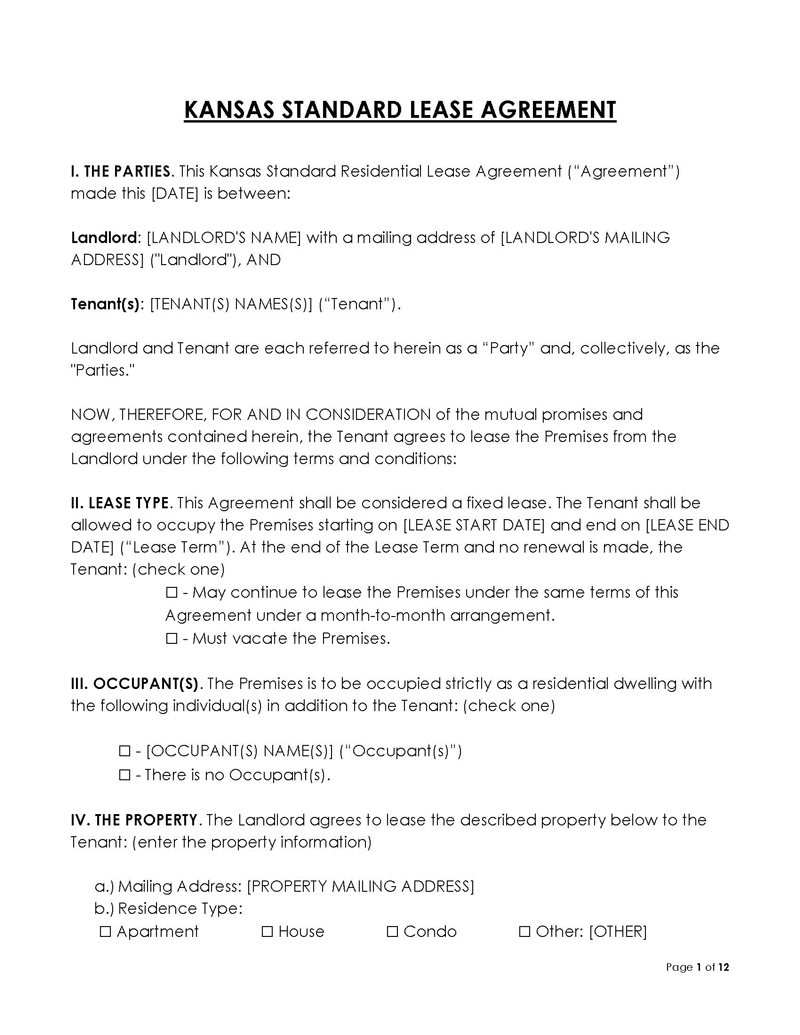Any property owner who wishes to rent out their property to a tenant must abide by all the rules in the Kansas legislature. According to the Kansas landlord-tenant laws, several terms and conditions must be established and agreed to by all parties to create a legally binding lease.
The essential details to be included are identifying information.
EXAMPLE
The names of the tenant and landlord and the exact address of the rented property
Afterward, specific clauses should be included that detail any rules, such as if pets are allowed. Likewise, the potential tenant must make any disclosures about potential health hazards. Finally, the lease agreement must include all the financial specifics about the rent, security deposit, and payment methods. Knowing the specific laws that govern these agreements will ultimately protect your rights.
Kansas Lease Agreement
A lease agreement in Kansas is a legal contract that gives a homeowner the ability to rent out different residential properties to a potential tenant.
In exchange, the tenant will provide a monthly economic compensation. Usually, this document will be signed after meeting with the tenant and agreeing to the conditions. All commercial lease agreements are governed by Chapter 84, Article 2A, while residential agreements are defined in Chapter 58, Article 25 (Landlords and Tenants).
After checking the potential tenant’s proof of earnings and criminal background, the landlord can offer the agreement in Kansas that communicates all the terms that both parties have to agree to. Once both parties sign the contract, the tenant has the lawful right to stay on the property for the specified amount of time. This type of contract can be utilized for various situations, both residential and commercial.
Lease Agreement Types
As mentioned, there are many kinds of the agreements available in Kansas. These contracts are crucial in establishing a clear understanding of the terms and conditions of the tenant’s right to reside and use the property.
Here are some of the most typical kinds of these agreements in Kansas:
Association of realtors agreement
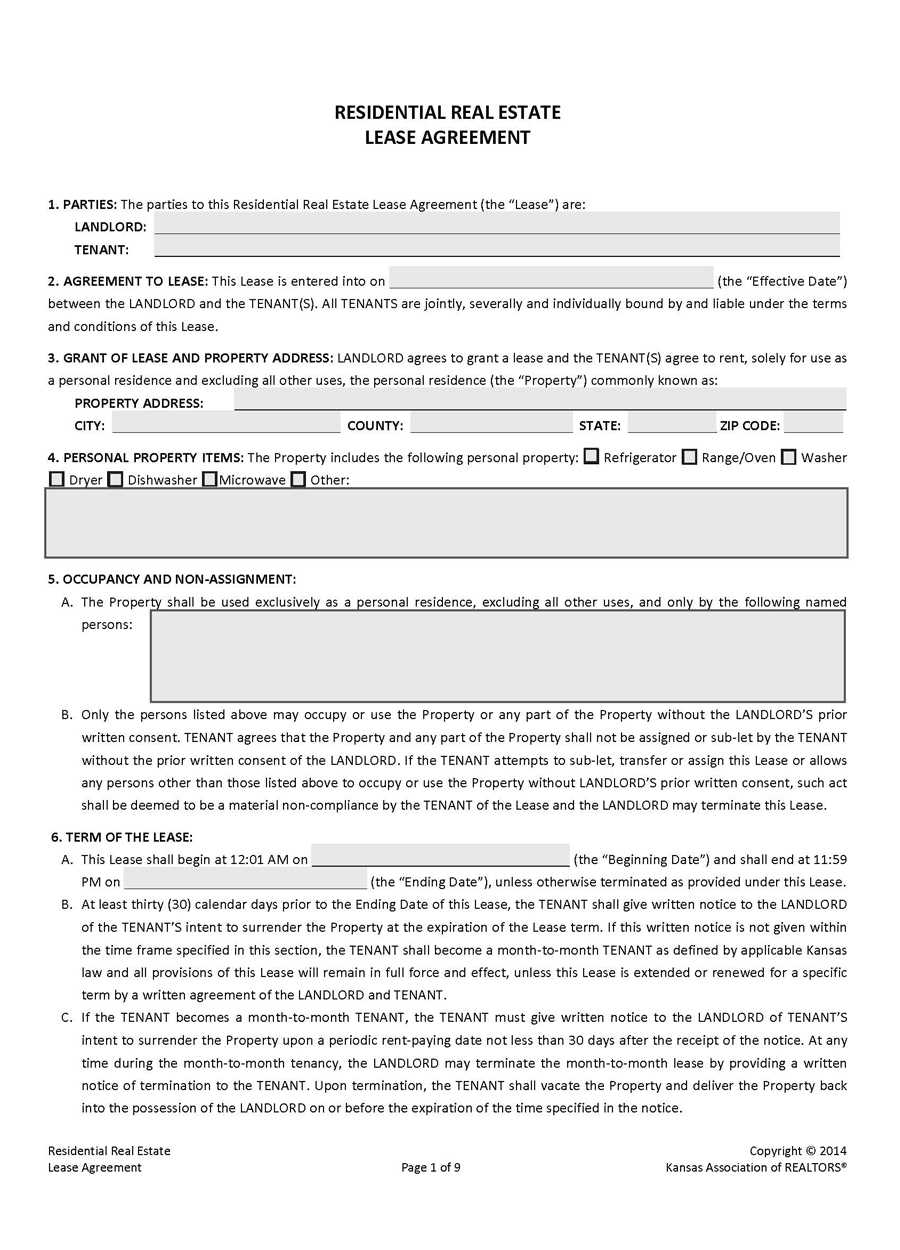
This is a standard reusable rental contract that is much more flexible than other rental contracts in Kansas. These negotiable terms allow for more specific time frames and rent amounts, allowing both parties to negotiate. In Kansas, these association of realtors residential lease agreements, while allowing for both fixed-term and month-to-month periods, still include all the standard information and conditions that any other agreement would contain. If a long-term agreement is going to occur, it’s generally good practice to document everything as time goes by.
Commercial lease agreement
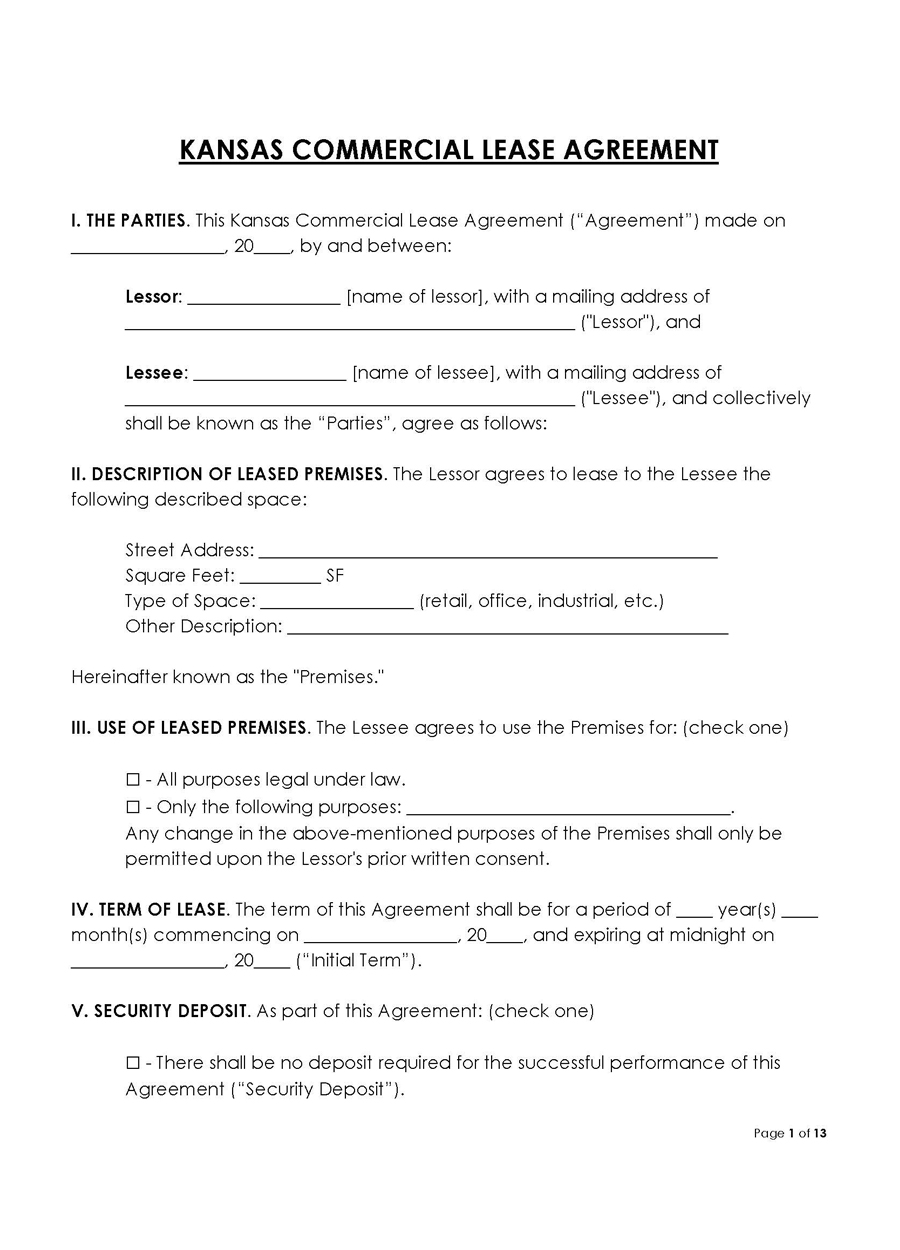
The commercial lease agreement is a unique contract used to rent out a space that will be a primary business location. These commercial leases can be utilized for many different spaces, such as offices, restaurants, or industrial buildings. Additionally, these contracts tend to be much longer in duration. These contracts should be signed, and both parties will be held responsible for maintaining the terms and conditions of the contract. For this reason, Kansas commercial agreements must always include the details regarding the proceedings. This includes the time for the contract’s validity and all economic stipulations, such as monthly rent and security deposits. It should also specify whether any renovations to the property are allowed.
Month-to-month lease agreement
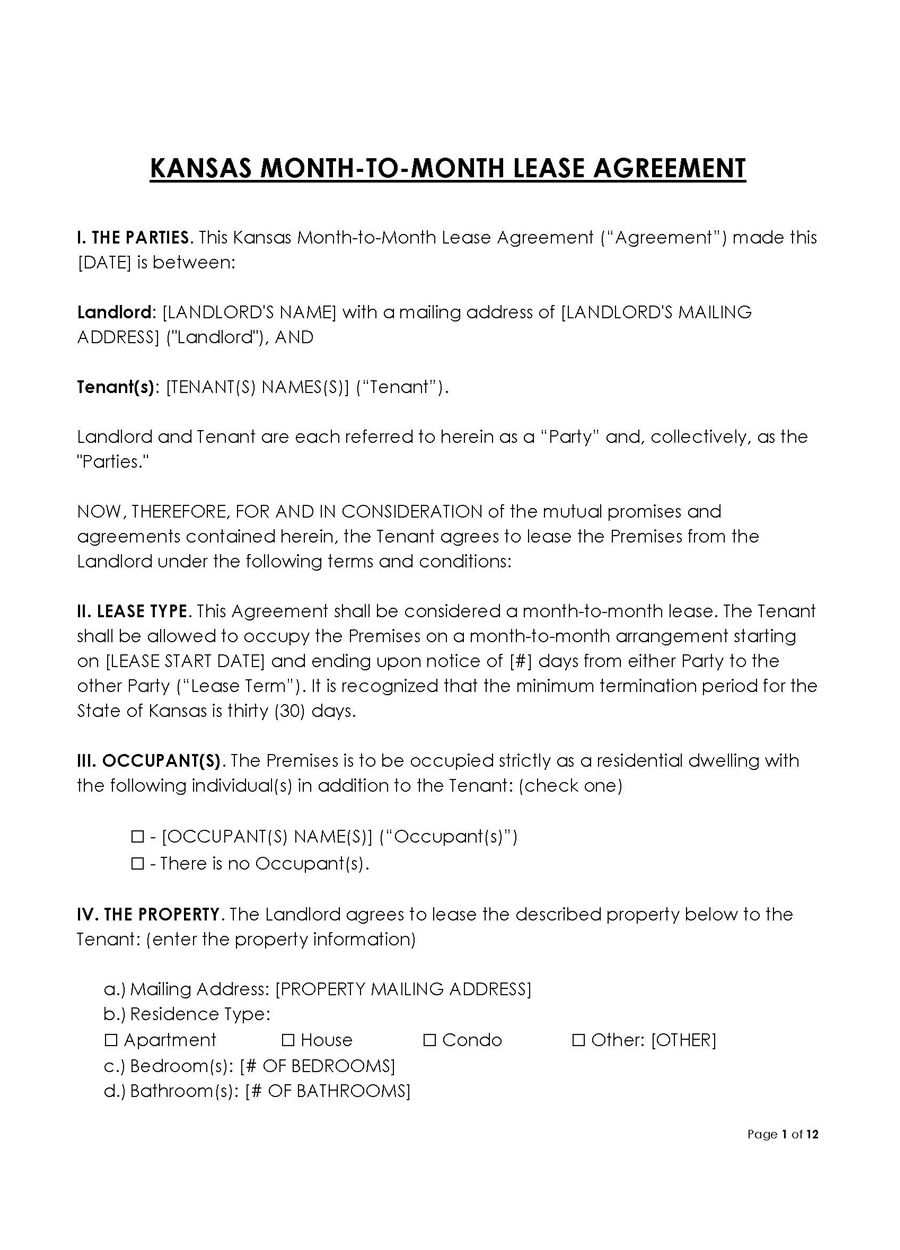
This contract is a standard rental agreement in Kansas without a fixed term but instead uses a system that renews every month. This allows both the tenant and the property owner to end the lease within 30 days and still keep a sense of flexibility. This type of agreement still requires notice to be given to both parties. According to Chapter 58, Article 25, it’s recommended to send notice by certified mail and a return receipt to show proof. This guarantees that neither party suddenly faces any financial complications. Regardless, the same conditions are still applied to the roles of tenant and landlord, and both parties may still be held responsible for upholding the terms of the agreement, as with any other arrangement.
Rent-to-own lease agreement
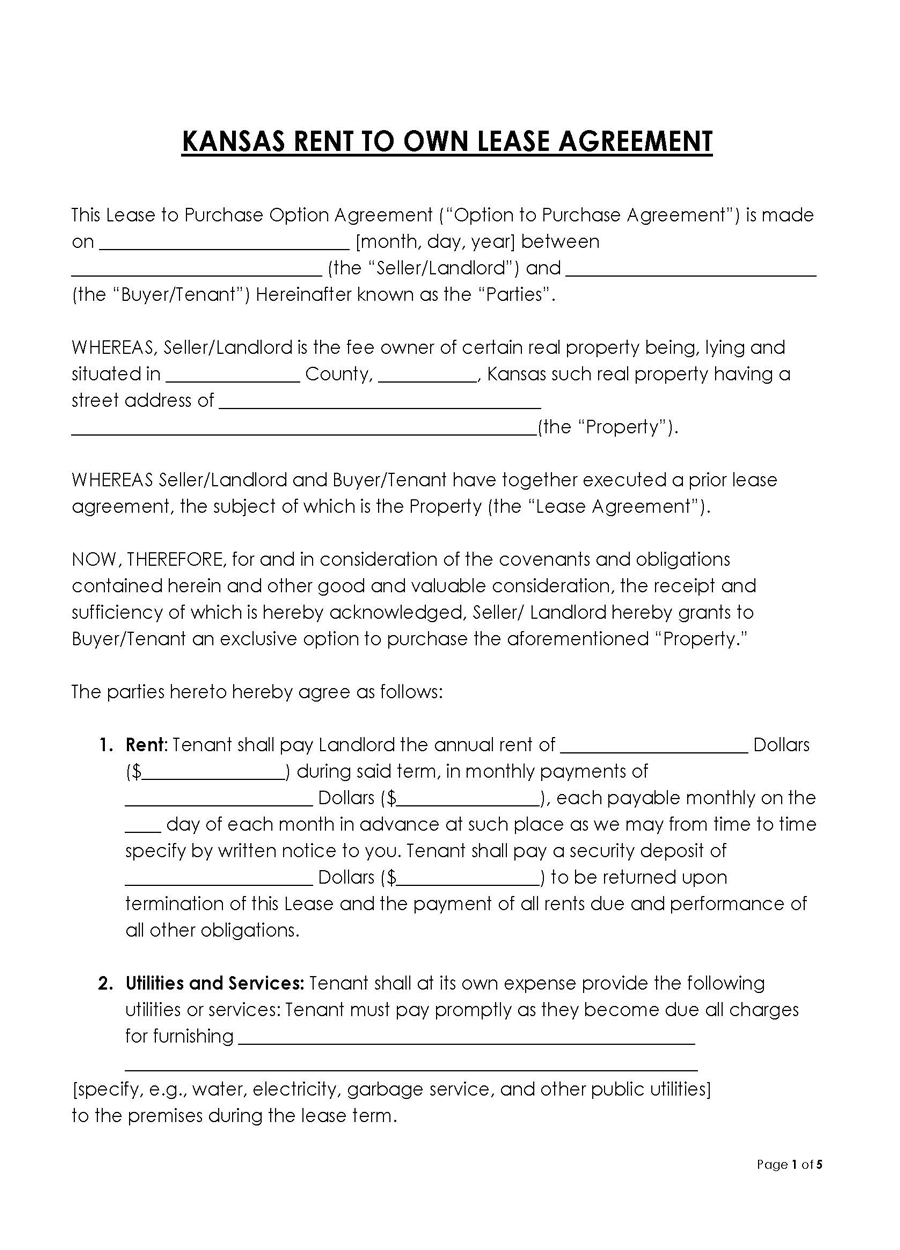
A rent-to-own lease agreement in Kansas is a different kind of document that allows the tenant the capacity to buy the property. This document will include the same terms and conditions as a standard document and detail the proceedings if the tenant chooses to purchase it. The tenant isn’t required to purchase the property, but they ultimately may do so. If the tenant does not choose to buy it, the contract will end like a standard Kansas agreement. The landlord will generally check to ensure the tenant can purchase the property before moving forward.
Roommate lease agreement
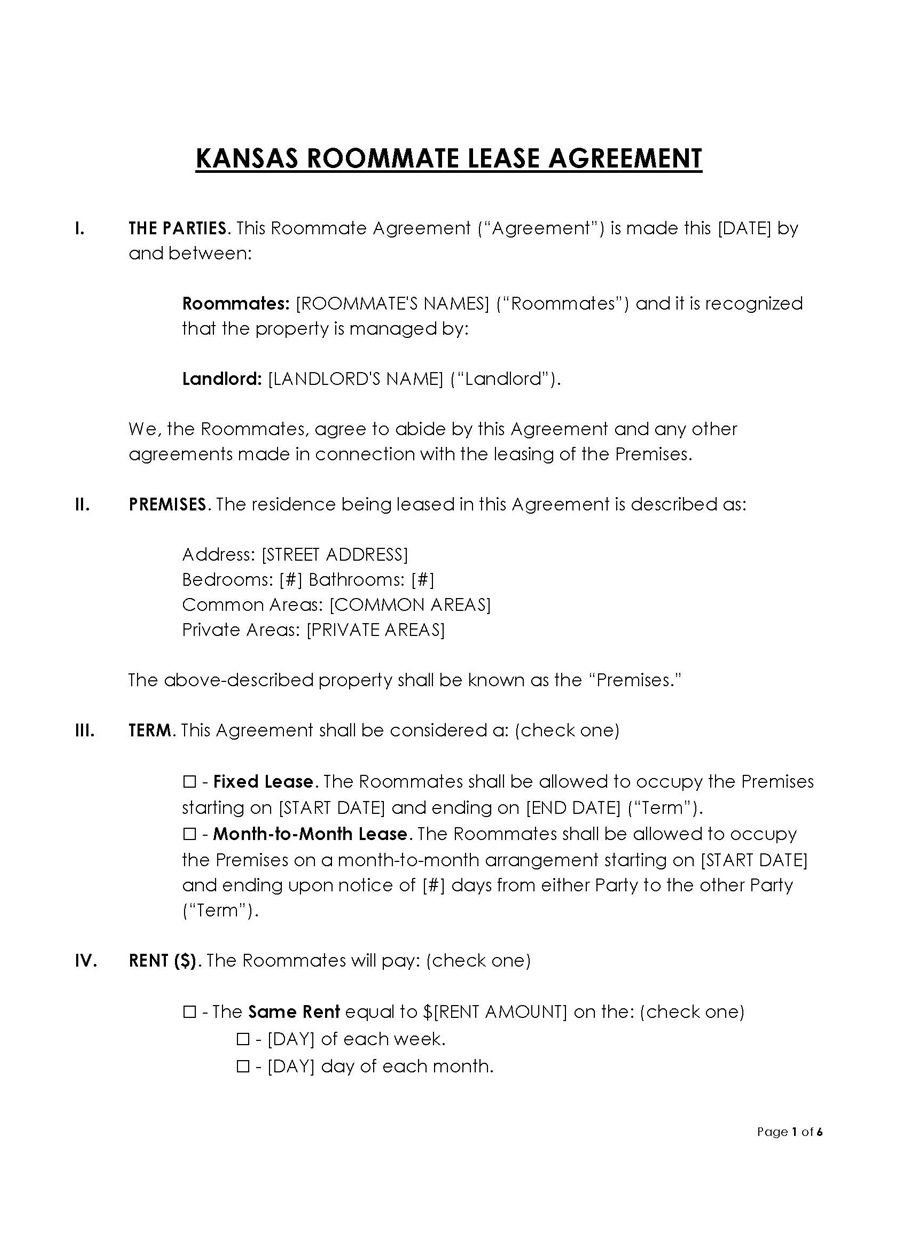
A room rental agreement is usually created for tenants sharing the same home. This type of agreement contains many specific arrangements and often is used to protect tenants from becoming liable for another tenant damaging the property. These contracts are held between roommates, meaning that they do not necessarily affect the landlord. Likewise, usually one of the roommates will have a legally binding agreement with the landlord.
Standard lease agreement
This agreement in Kansas is a formal document that includes the terms and conditions of a tenant using a landlord’s property. This binding contract will clarify all the requirements of the relationship. As the objective of this agreement is to protect both parties, the tenant and the landlord must approve all the conditions of the document and sign it. In many cases, a landlord may request an approved rental application and a security deposit to verify that a tenant can pay the rent consistently. This type of contract is governed by Kansas state laws, such as Chapter 58, Article 25.
Sublease agreement
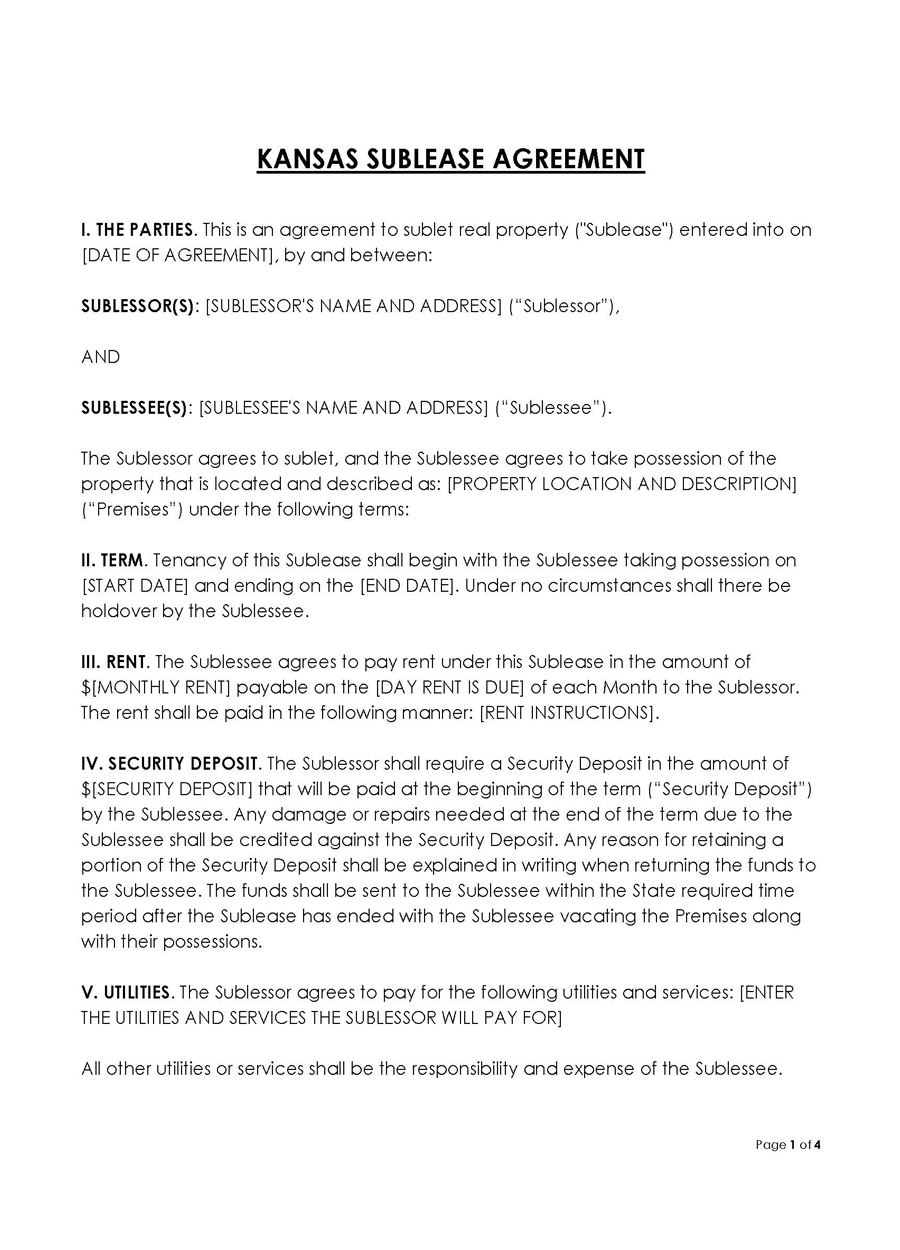
This flexible agreement is a contract between a current tenant and a potential lessee who will substitute them in the living situation. The current tenant, also known as the sub-lessor, remains responsible for the conditions of their initial contract with the landlord. These types of agreements can be pretty flexible regarding the duration of the contract. Additionally, no sublease contract can last longer than the original standard agreement with the landlord. The agreement allows a tenant to escape any financial responsibility while still not putting the landlord in an unfortunate economic situation.
Kansas Lease Agreement Disclosures
Several disclosures must be pointed out with the traditional agreements in Kansas. These details guarantee that every possible aspect of the living arrangement is mentioned so that neither party suffers from any misunderstandings.
Some of the disclosures that must be included are:
According to § 58-2551, the landlord’s full name and permanent business address must be listed. Likewise, any individual authorized to act on the property owner’s behalf must also have detailed identifying information. If the address changes, the updated one must be immediately provided to the tenant. If any legal notices, official requests, or formal services need to be sent, the tenant can appropriately send them to the landlord.
Lead-based paint
Within the USA, federal legislation calls for all landlords to warn renters of the possible dangers of lead-based paints for any homes constructed before 1978. In Kansas, the landlords must attach a specific disclosure form, which the tenant must sign to show that they have acknowledged its contents.
Move-in checklist
A move-in checklist is a way to protect the tenant from being held liable for any previously damaged furnishings. A landlord must provide the tenant with this checklist on the move-in day or five days later. A copy should then be provided to both parties.
This checklist is a valuable way to balance and identify any security deposit withholdings and to demonstrate that items were returned in the same state they were found.
Inventory and condition of premises
The landlord and tenant must hold a walk through session together to uniformly agree upon any necessary repairs or any minor damages that may appear. They should create an itemized checklist that can be used as a comparative document to establish whether or not the potential damages are the tenant’s responsibility when they abandon the property. This process should be exceptionally detailed to protect the tenant and carried out within the first five days of tenancy.
Late and returned check fees
Another vital disclosure to document is the procedure in the case of a late or returned check. Often, a bounced check fee will reflect the expenses a landlord might incur from such an incident. While there is no legal boundary to these fees, they are usually less than 10% of the rent. The agreement should declare that these late fees may only be applied after the specified monthly rent due date.
Shared utility agreement
If multiple tenants or properties share the same utilities, the agreement in Kansas must pinpoint the procedure for calculating the bill for all tenants. This will give the future tenants an estimate of the monthly amount they will need to pay.
Bed bug disclosure
When a rental property records bed bug infestations, the landlord must deliver that information by writing the agreement in Kansas. This disclosure will inform the tenant that they will be responsible for reporting any future infestations to the landlord and cooperate with any measures to handle a new infestation.
Asbestos disclosure
Landlords must attach an asbestos disclosure declaration if their property was built before 1981. These disclosures provide an understanding between the tenant and the landlord of the current existence of any asbestos and any specific instructions they should follow to maintain a safe living environment.
Mold disclosure
If there is any current mold on the property, the landlord must inform the tenant. This protects the tenant from being held responsible for any damages related to mold in the future.
Landlord and Tenant Laws
There are several laws that both the landlord and the tenant must abide by during this professional relationship. This guarantees a smooth living arrangement for the tenant and an effective professional process for the landlord.
Some of the most important laws regarding this situation are:
Security deposit
In a Kansas agreement, a landlord may only establish one month’s worth of rent as a security deposit, as established in § 58-2550. However, if the property is furnished, the security deposit may increase to 1.5 months’ worth of rent.
The security deposit should be returned to the tenant within 30 days of vacating the property, as stated in § 58-2550(b). If any deductions are made, the landlord must submit an itemized list within fourteen days.
Access
If a landlord chooses to enter rental property, the only requirement is that they provide a reasonable written or verbal notice to a tenant, as declared in § 58-2557. Therefore, the landlord’s right of entry is more flexible in Kansas than in other states, as the only requirement is that the notice is reasonable.
Pet deposit
A landlord is legally allowed to increase the security deposit up to ½ month’s rent if a tenant has a pet. However, this is not applied if a tenant has a certified service or assistance animal. While this federal protection prevents any additional security deposits, the tenant is still responsible for any potential damages done by the animal.
Kansas Lease Agreement
Frequently Asked Questions
In Kansas, the maximum period that can be established for a standard contract is one year. After one year, a tenant and landlord may choose to renew the lease. However, this must be completed in writing. A verbal renewal is not legally binding.
Kansas’s contract becomes legally binding once both parties have signed the lease. Afterward, both parties must comply will all the terms and conditions established during the contract’s validity.
A tenant and a landlord may decide that notarizing a lease may be advantageous. However, it is not legally required in Kansas. Instead, this contract becomes legally binding upon signing, as long as the document meets all the required criteria.
In Kansas, yearly contracts can renew automatically if tenants do not overtly state their desire to abandon the property. Afterward, it continues to be a new standard yearly contract, repeating for the next calendar year and starting at the original document’s expiration date.
